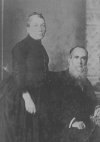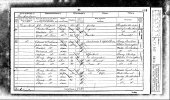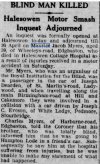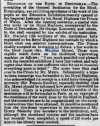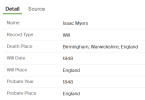Chris mentioned Maurice and an accident. Not sure if he has seen this.
Thank you for that, Janice. Yes, I was aware of it. Although not the second one. There are a couple of further reports too, somewhere or another, giving further information on the tragedy. All this has prompted me to jot down what is now known about my Gt. Uncle Maurice and I'll bore you with that below.
(The cutting also contains an interesting fragment of information about his half-brother, Charles, my grandfather - I'll come back to that separately).
A GLIMPSE OF MY GREAT-UNCLE MAURICE MYERS
My father's Uncle Maurice (Maurice Jacob Myers) was born in 1874 at 3, Monmouth Street in Birmingham, to the widowed Henry (my great-grandfather) and his second wife, Rose. He was my grandfather's stepbrother and, like his brother and later his nephew, was educated at King Edward's in New Street. He trained as a Typewriter (typist/stenographer) and that is how he earned his living up until his premature death in 1933, three years before I was born.
Maurice followed in our rather remarkable family tradition of the time. His father, Henry, had gone to Gold Rush California in around 1851 (a little late to the party), established himself there in the town of Oroville (City of Gold) for several years and eventually returned, for reasons unknown, in autumn 1859. My own grandfather, Charles, followed his lead in the 1880s and had a spell in the USA of unknown length, including helping to build a railroad in Florida. And later, some time after 1891, the younger Maurice also maintained the tradition by earning his living as a stenographer in New York. (My father always thought that he might have been expected to follow family practice in the next generation but, if that prospect ever existed, it was superseded by an appointment in the trenches on the Western Front in 1918. And so he had to wait until 1935 to see the New World for the first time and that was with the help of a business trip on a Cunarder. This is he, probably taking in his first glimpse of it from the deck of the "Antonia" in March 1935).

Maurice's time in the USA came to an unfortunate, and possibly premature end. He was permanently blinded in an incident involving a weapon of some type. All sorts of exotic circumstances immediately spring to mind but I have recently come across a letter written many years ago by my father's younger sister, Grace, which states that Uncle Maurice's disability was caused by an accident when he was cleaning his personal weapon, presumably a revolver, in New York. So, like his father and stepbrother before him, he did not make a permanent home in the USA but returned to Birmingham to live with his two unmarried step-sisters, Julia and Rose, in Wheeley's Road, Edgbaston.
Maurice continued with his profession and became a well-known stenographer in the city. He achieved some public exposure by having taken a short piece of dictation at an exhibition from the then Prince of Wales, later King Edward VII. This is an image of Maurice in action, possibly around the time of that exhibition. He had a close association with the Birmingham Institute for the Blind which was then located in its own, custom-built premises in Carpenter Road, Edgbaston. And that is how Maurice lived his life and obtained, presumably, a reasonable income, despite his unfortunate disability.
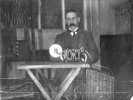
In April 1933, Maurice was travelling with a friend on a fishing trip to Hampton Loade on the River Severn. It was a small car and I have always imagined it as an early Austin Seven. They were descending Mucklow Hill in Halesowen; for one reason or another, the driver lost control and hit a vehicle coming in the opposite direction. I believe he survived but Maurice was fatally injured and died shortly afterwards in hospital. Whether, if he had been sighted, he would have been able to do something to protect himself, we shall of course never know. For ever after that the name of Mucklow Hill seemed to me to have a sinister connotation within our family if it was ever mentioned – either because of the circumstances surrounding Maurice death or because of its broader reputation in those times for serious accidents.
My father seemed to possess one or two items once belonging to Maurice. These included an ageing and increasingly deteriorating set of fishing rods which had lived for many years in the damp of our garage in Streetly. In about 1942/3 when I started to express an interest in fishing at the age of six or seven, Dad dug these out and spent a few evenings renovating them, using foul smelling adhesive and lengths of thread to act as bindings. They and Maurice's little canvas bag with its couple of reels, floats and hooks served me well for a few years until the interest waned. Perhaps fortunately, I was never conscious of the link all these items must have had with my great-uncle's tragic death. My father would have been, of course. He always spoke kindly of his late uncle and I imagine the circumstances of his death at the age of 59 were a significant blow.
For us, now, all we have of Marice's life is a few fragments of memory and the odd image of him as a mature adult. Nothing from his childhood or early manhood. As we look at a later image of him, with his serious face, the forbidding Victorian/Edwardian moustache and the sightless eyes, we can have no idea what sort of man he was. And so we are fortunate that there survives in the family record a flimsy cutting from a contemporary specialist magazine where his obituary appeared in 1933, obviously penned by a good friend who knew him well.
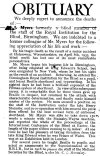
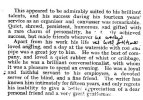
Not a bad way to be remembered.
Chris

